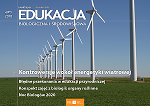Wątpliwe zmiany klimatu i straszny wilk
Uncertain climate changes and dangerous wolf
Misconceptions in science education
Author(s): Izabela Jaszczuk, Marcin Chrzanowski, Aleksandra Zarzycka, Joanna LilpopSubject(s): Education, Energy and Environmental Studies
Published by: Instytut Badań Edukacyjnych
Keywords: alternative conceptions; environmental education; climate change; environmentalist; ecologist; State Forests;
Summary/Abstract: One of the most important challenges faced by modern society is responsible environmental education. In the light of global environmental changes, such as climate change, biodiversity loss, and land-use change we as a society need to raise awareness of the anthropogenic impact on the environment and increase the level of public support for mitigation and adaptation. Media are the main source of information about environmental issues. Information provided by media is often subjective and depends on the worldview of individuals or social groups. Media can often provide misinformation and they can be a significant source of the misconceptions (alternative conceptions). Currently, the main environmental issues in the public focus include climate change, forest management, and hunting. To examine the frequency of misconceptions related to these issues among the students finishing primary schools (Polish: szkoła podstawowa; SP) and students finishing middle school (Polish: gimnazjum; G) we made survey containing 8 closed questions regarding environment and environmental protection and 2 open questions related to the two main social groups participating in ecological discourse in Poland – foresters and environmentalists. Analysis of 462 surveys showed that there is no significant difference in the percentage of incorrect answers (misconceptions) between primary and middle school students – 22% and 23%, respectively. The most alternative conceptions were recorded in question concerning fear of a wolf. The most difficult topic - the highest percentage of the answers ‘don’t know’ - is global climate change. The percentage of incorrect answers (misconceptions) did not differ between the group of students who declared different level of interest in the Natural Sciences, or between the groups who declared different extent to which they take the knowledge gathered from media into account in the decision-making. Students had more positive attitude towards the forester than towards the environmentalist/ecologist.
Journal: Edukacja Biologiczna i Środowiskowa
- Issue Year: 2018
- Issue No: 4
- Page Range: 16-41
- Page Count: 26
- Language: English

